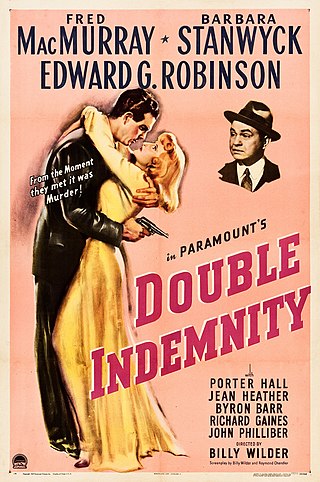
Double Indemnity is a 1944 American film noir directed by Billy Wilder and produced by Buddy DeSylva and Joseph Sistrom. Wilder and Raymond Chandler adapted the screenplay from James M. Cain's novel of the same name, which ran as an eight-part serial in Liberty magazine in 1936.

Frederic Sackrider Remington was an American painter, illustrator, sculptor, and writer who specialized in the genre of Western American Art. His works are known for depicting the Western United States in the last quarter of the 19th century and featuring such images as cowboys, American Indians, and the US Cavalry.
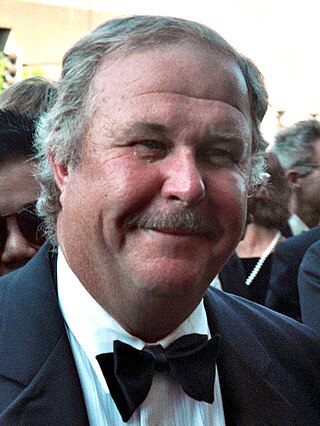
Ned Thomas Beatty was an American actor. In a career that spanned five decades, he appeared in more than 160 films. Throughout his career, Beatty gained a reputation for being "the busiest actor in Hollywood". His film appearances included Deliverance (1972), White Lightning (1973), All the President's Men (1976), Network (1976), Superman (1978), Superman II (1980), Back to School (1986), Rudy (1993), Shooter (2007), Toy Story 3 (2010), and Rango (2011). He also had the series regular role of Stanley Bolander in the first three seasons of the hit NBC TV drama Homicide: Life on the Street.

Eddie Asner was an American actor. He is most notable for portraying Lou Grant on the CBS sitcoms The Mary Tyler Moore Show and Lou Grant, making him one of the few television actors to portray the same character in both a comedy and a drama.
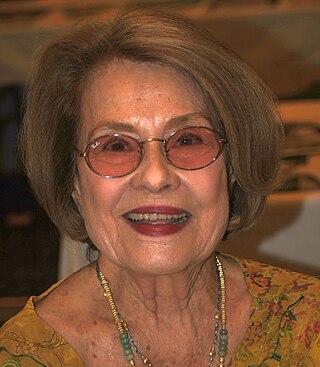
Diane Carol Baker is an American actress, producer and educator whose career spanned nearly 50 years.

Beatrice Wood: Mama of Dada is a 1993 documentary film written and directed by Tom Neff about the avant-garde Dada artist Beatrice Wood.
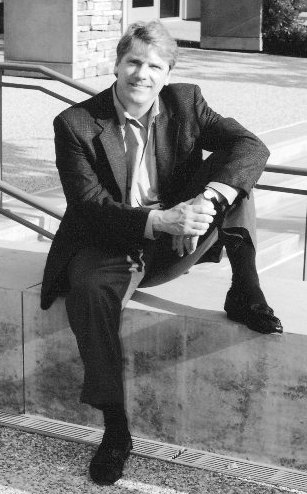
Thomas Linden Neff -, known as Tom Neff, is an American film executive, director and producer, born in Chicago, Illinois. He lives in Nashville, Tennessee.

A Cry in the Wild is a 1990 American coming-of-age survival drama film based on the book Hatchet, written by Gary Paulsen. The film stars Jared Rushton as Brian, Pamela Sue Martin as Brian's mom, Stephen Meadows as Brian's dad, and Ned Beatty as the pilot. It spawned three sequels: White Wolves: A Cry in the Wild II; White Wolves II: Legend of the Wild; and White Wolves III: Cry of the White Wolf.

Susan Steinberg is an American television producer, writer, and director. She is sometimes credited as Sue Steinberg.

Barry Rubinow is a film executive and editor, born in Glen Rock, New Jersey, a suburb of New York City. Currently, he lives in West Hills, Los Angeles, California.
The Soap Myth is a play by American playwright Jeff Cohen. It dramatizes the conflict between Holocaust scholars and historians who require documentary proof when determining the history of the Holocaust and survivors of the Holocaust who were eyewitnesses to the horrors and atrocities. The play tackles the larger question of who has the right to determine the truth, who has the right to write history. The play also grapples with antisemitism and Holocaust denial.
Marion "Muffie" Meyer is an American director, whose productions include documentaries, theatrical features, television series and children’s films. Films that she directed are the recipients of two Emmy Awards, CINE Golden Eagles, the Japan Prize, Christopher Awards, the Freddie Award, the Columbia-DuPont, and the Peabody Awards. Her work has been selected for festivals in Japan, Greece, London, Edinburgh, Cannes, Toronto, Chicago and New York, and she has been twice nominated by the Directors Guild of America.

Benjamin Shapiro is an American documentary director, cinematographer, and independent public radio producer.
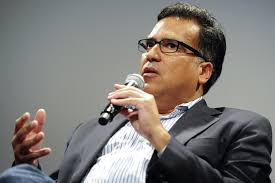
Phillip Rodriguez is an American documentary filmmaker and veteran content provider for PBS.
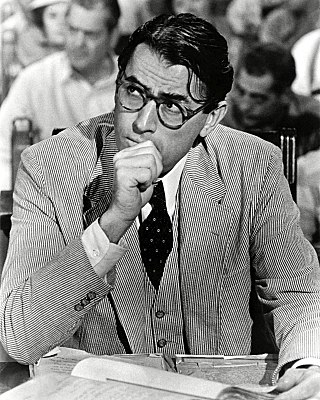
Gregory Peck (1916–2003) was an American actor who had an extensive career in film, television, radio, and on stage. Peck's breakthrough role was as a Catholic priest who attempts to start a mission in China in the 1944 film The Keys of the Kingdom, for which he received his first nomination for the Academy Award for Best Actor. In the same year, he played Count Vronsky in a radio adaptation of Leo Tolstoy's Anna Karenina. He followed this by starring in Alfred Hitchcock's psychological thriller Spellbound (1945) with Ingrid Bergman. In the late 1940s, Peck received three more nominations for the Academy Award for Best Actor for his roles as a caring father in The Yearling (1946), a journalist who pretends to be Jewish to write an exposé on American antisemitism in Gentleman's Agreement (1947), and a brave airman in Twelve O'Clock High (1949).
MacArthur is a 1999 two-part television documentary film about Douglas MacArthur, a United States General of the Army. Produced by PBS for The American Experience documentary program, it recounts the significant events and controversies in MacArthur's life, from childhood to his death in 1964. Written and produced by Austin Hoyt, directed by Hoyt and Sarah Holt, and narrated by David Ogden Stiers, the film first aired on PBS in two parts on May 17 and 18, 1999.
LBJ is a 1991 two-part television documentary film about Lyndon B. Johnson, the 36th president of the United States. Produced by PBS for The American Experience documentary program, it recounts Johnson's life from his childhood to his presidency up to his death. Written, co-produced and directed by David Grubin and narrated by David McCullough, the film first aired on PBS in two parts on September 30, 1991.
The West of the Imagination is a six-part documentary series that aired weekly on PBS from September 22, 1986 to October 27, 1986. The series captured the story of the American "Wild West" as it was told through art, film, photography, music, and entertainers within broader pop culture. Created by Dr. William H. Goetzman and hosted by James Whitmore, The West of the Imagination was produced for PBS by KERA-TV, in association with the Independent Communications Association of Los Angeles and London. Alongside the series, W.W. Norton published a companion book, written by creator William H. Goetzmann.













